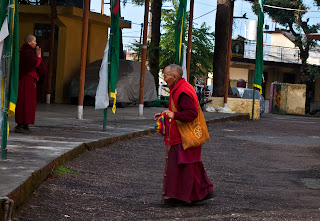I arrived at dawn and totted my backpack up narrow crumbling steps toward the Pink House, a budget hotel with all the luxuries I needed: a toilet, a bed, and hot water. The frills, free wifi, a rooftop café, and the thick blankets piled on the bed won my favor, as did the owner who seemed trustworthy and jovial. I recommend the place to travelers.

I later discovered that I wasn’t actually staying in Dharamsala proper, but rather up the road at McLeod Ganj. Most hotels are situated here, the bazaar is bigger, and there’s generally more to do.
To wander little McLeod Ganj is an exploit of the senses, though milder than larger cities of India, so I hear. In addition to the sights and sounds of Hindus, Tibetans, beggars, music, vehicles, cows, dogs and monkeys crowding the two parallel streets constituting the bazaar, strong smells of incense, marijuana, feces, garbage and cooking food lace the air.

After traveling around Northern India a bit, this area is definitely my favorite because of the sights, diversity, costs and friendliness—probably a result of the Tibetans.
The Tibetan influence is one that I wasn’t really interested in at first, and I didn’t much care that this place was often called “little Lhasa”. The village’s petite size and mountainous location were what drew me here first, as well as a perverse desire to see all the spiritual nut-jobs attracted here, and there are a few. But I’ve come to really appreciate the Tibetan influence, even if the Buddhist philosophy driving most of their society is implausible to me. Just the magnitude and perseverance of the Tibetan tradition, fueled by the philosophy and spiritual symbolism, is very awesome.
From my perspective (not an expert), the Tibetan society has told itself a beautiful and grand story, a myth, in which the people have stepped into and now live. It’s a good story; reincarnated Bodhisattvas, engines of karmic reward and retribution, nirvana, as well as hope and a means for those who suffer.
I wonder if the mind-boggling sums of cash Hollywood consistently grosses is an indication that modern people are searching for a same kind of myth or story—a narrative that gives their lives a sense of direction, purpose and a meaning more personal and vibrant than the ‘atoms in the void’ story that contemporary science tells. When God died, Hollywood was born.
To live the Tibetan story requires costumes, props, symbolic places, symbolic behaviours and scripts.
To live the Tibetan story requires costumes, props, symbolic places, symbolic behaviours and scripts.







No comments:
Post a Comment